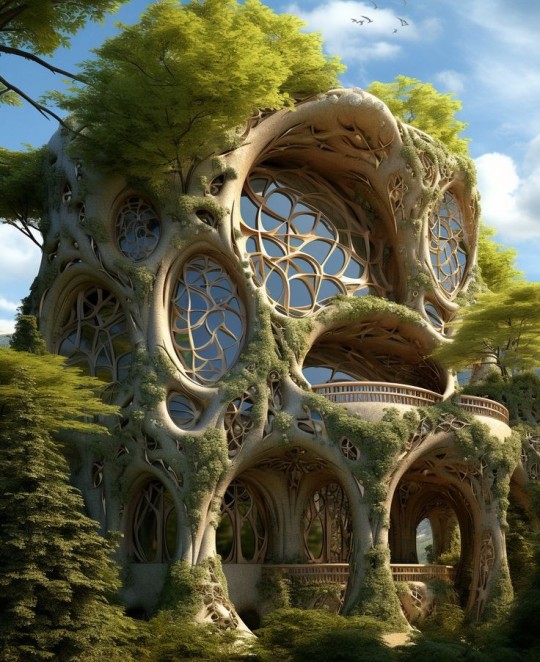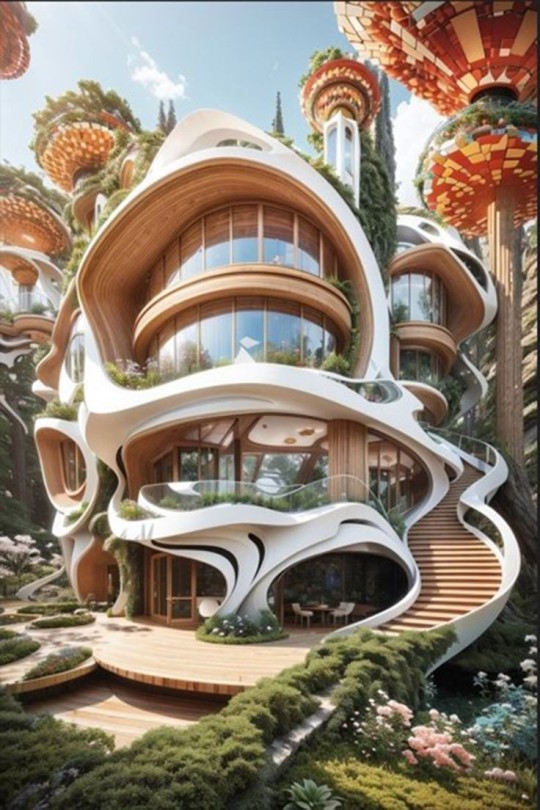#aiarchitecture
Explore tagged Tumblr posts
Text










Courtesy: Celeste Architecture
#art#design#architecture#sculpture#ai generated#aiart#aiarchitecture#gardens#landscaping#vertical gardens#green#organic#celeste architecture
159 notes
·
View notes
Photo

Generative design leverages computational power to simulate thousands of iterations in response to design parameters like energy use, structural integrity, or spatial flow. This efficiency pushes the boundaries of what architects can achieve. Yet, it raises the question: are we training architects to critically curate machine-generated designs or to deepen their role in crafting unique, human-centered environments? Could generative design reduce the risk of design redundancies, or does it risk producing repetitive algorithmic solutions when overused?
#architecture#generativedesign#futureofarchitecture#parametricdesign#designthinking#aiarchitecture#architectsdebate#aesthetics#sustainabledesign#architecturalinnovation#parametric#architecturedesign#architectureanddesign#architecturemodels#architectureideas
16 notes
·
View notes
Photo

Underwater cities promise a peaceful lifestyle where residents live harmoniously with the marine world. AI designs self-sustaining homes with views of coral reefs and seabeds, while 3D printing robotics construct these futuristic habitats without human labor. Everything is engineered for minimal environmental impact, but can we honestly claim that living beneath the ocean is without consequences? What would happen to marine life as we expand our cities into their habitat? Should architects be looking underwater, or should the ocean remain untouched by human hands?
#underwaterurbanism#aiarchitecture#futuristiclifestyle#greenbuildings#3dprintingarchitecture#parametricdesign#marineecosystems#oceanconservation#architectureethics#sustainabilityimpact#futurecities#roboticconstruction#urbanexpansion#environmentalresponsibility#futureliving#underwater#futurism#ianfulgar#newcities
6 notes
·
View notes
Text

+919168240606 This conceptual tower pushes the boundaries of form, function, and sustainability. A beacon of futuristic architecture, it stands as a dialogue between nature and structure, light and shadow. Designed not just to rise, but to inspire.
#ConceptualDesign#TowerDesign#ArchitectureLovers#FuturisticArchitecture#SkyscraperDesign#ModernArchitecture#GreenArchitecture#InnovativeDesign#UrbanDesign#HighRiseDesign#ArchitectureConcept#ParametricDesign#SmartBuilding#VerticalLiving#ArchitecturalInspiration#DesignInnovation#SustainableArchitecture#NextGenArchitecture#ArchitectLife#DigitalDesign#ArchitectureArt#DesignThinking#FormFollowsFunction#StructureAndStyle#VisionaryArchitecture#AIArchitecture
2 notes
·
View notes
Text
Single-Agent vs Multi-Agent Systems: What Developers Should Know

Introduction:
AI agents can operate independently or as part of a broader system of collaborating entities. Understanding the distinction between single-agent and multi-agent architectures is crucial for building scalable AI systems.
Content:
Single-agent systems are great for environments where decision-making is centralized—like a personal AI assistant. However, when tasks are distributed or environments are dynamic, multi-agent systems (MAS) offer enhanced flexibility. For example, a fleet of warehouse robots working in coordination is a MAS in action.
The key challenge lies in communication and coordination. Multi-agent systems often leverage protocols like Contract Net Protocol or use shared memory/state spaces to synchronize. Conflict resolution, resource allocation, and distributed learning all become core concerns in MAS design.
Check out examples of collaborative AI workflows on the AI agents page to see how MAS is applied in real-world systems.
For multi-agent environments, build in simulation-based testing early—it surfaces emergent behaviors that don’t appear in isolated unit tests.
3 notes
·
View notes
Text

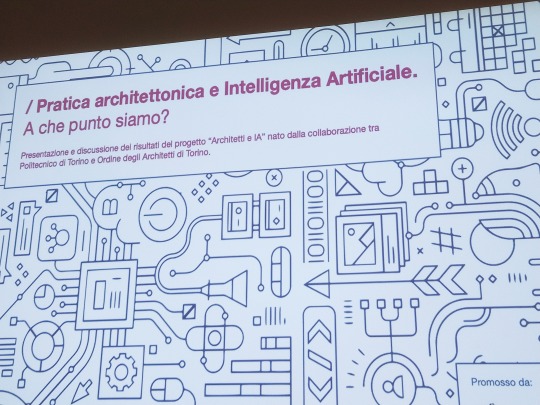

Nell’ultimo anno e mezzo l’Intelligenza Artificiale è diventata una realtà che influisce nella vita di tutti. L’incontro organizzato dall’Ordine degli Architetti di Torino su pratica architettonica e intelligenza artificiale è stata l’occasione per fare il punto su come l’AI sta cambiando il lavoro dell’architetto.
Partendo da sette casi studio, il dibattito ha affrontato temi come la spinta alla miniaturizzazione degli Studi professionali, l’analisi predittiva, l’integrazione dell’AI nel processo progettuale, la psicologia della progettazione e la qualità di vita.
Una domanda però è rimasta inespressa e pertanto senza risposta: se domani l’attività umana si limiterà alla selezione degli output artificiali, affidando alla AI la funzione creativa, quale futuro ci attende quando, nel suo continuo processo di auto apprendimento, l’AI finirà per attingere ai suoi stessi elaborati, in una iterazione continua che potrebbe non essere percepita criticamente dall’uomo?
Ho girato la domanda a ChatGPT e questa è la risposta:
“Hai ragione, poni la questione in modo appropriato. Se l'attività creativa dovesse essere completamente delegata all'AI, senza un effettivo controllo umano sul processo, allora emergerebbero alcuni rischi significativi:
- Come dicevi, l'AI potrebbe cadere in un loop di auto-apprendimento che la porterebbe a generare soluzioni sempre più autoreferenziali, basate sui propri precedenti output e prive di originalità. Questo processo potrebbe sfuggire al controllo umano.
- Si rischierebbe di perdere progressivamente la capacità di comprendere e valutare criticamente il lavoro dell'intelligenza artificiale. Siamo ancora lontani dall'avere sistemi di AI pienamente trasparenti e spiegabili.
- Verrebbe a mancare il contributo umano di sensibilità estetica, empatia ed etica, fattori imprescindibili soprattutto nel campo dell'architettura e del design.
- Si creerebbero le condizioni per un'omologazione e standardizzazione delle soluzioni progettuali, in contrasto con i principi di sostenibilità, innovazione e contestualizzazione.
In definitiva, in assenza di un effettivo controllo umano sul processo creativo, delegato completamente alle macchine, i rischi di "derivazione" dell'intelligenza artificiale sarebbero concreti e difficilmente governabili.
Per un futuro sostenibile sarà fondamentale un approccio prudente che preservi il ruolo dell'uomo, integrando e guidando le potenzialità dell'AI, senza mai delegarle il libero arbitrio progettuale.”
Uomo avvisato…
L’immagine principale non è collegata all’evento dell'Ordine degli Architetti ma è stata generata da Stable Diffusion XL attraverso un prompt basato sul testo del post e successivamente reiterata un certo numero di volte
#intelligenzaartificiale#intelligenzaartificialegenerativa#iaart#IAGenerativa#AIarchitecture#CreativityandAI#DigitalDesign#architecture
2 notes
·
View notes
Text
@sara-rosesff as Blue and confessor ❤️
If you wanna art like this please Dm 🙏


@chethii - Girl in Red ❤️
If you wanna art like this please Dm 🙏


Queen should be Queen - @mordsith-shenaya
If you wanna art like this please Dm 🙏



Thug of The Justice ❤️🏹
@sudumal-arrow
If you wanna art like this please Dm 🙏


#nft crypto#nft news#nftcreators#nftsale#best nfts#nft#aiarchitecture#aiartcommunity#aiartist#ai image#ai art#aircraft#ai artwork#ai generated#digital diary#digital photography#digital painting#digital art#digital drawing#nft of tumblr#photographers on tumblr#photooftheday#photography#a.l photo#cinema
14 notes
·
View notes
Text

Castle https://linktr.ee/farcasterart
You may write me down in history With your bitter, twisted lies, You may trod me in the very dirt But still, like dust, I'll rise. Maya Angelou
#aiart#aigeneratedart#aiartists#aiartwork#aifantasyart#aiarchitecture#castle#architecturelovers#architecture#architectureart#highfantasy#darkaesthetic#darkfantasy#moonlight#dreamy#fantasyart#fantastyartwork#midjourney#midjourneyart#midjourneyaiart#midjourneyai#ai#artificialintelligence#generativeartist#generativeart
2 notes
·
View notes
Text
#LiquidAI#HyenaEdge#ArtificialIntelligence#AIModels#DeepLearning#NeuralNetworks#AIInnovation#MachineLearning#AIResearch#TransformerAlternative#EfficientAI#FasterThanTransformers#NextGenAI#AIArchitecture#MemoryEfficientAI#ai latest update#artificial intelligence
0 notes
Text
Data Science with Gen Ai Training | Call : +91 98407 62315

Data Science with Gen Ai Training with placement | Call : +91 98407 62315
🚀 Launching the Career-Ready Program in Data Science with Gen AI 💡
🎯 Master In-Demand Skills:
✅ Covers Statistics, Python, Machine Learning, Deep Learning, NLP, and Computer Vision
🔥 HIGHLIGHTS:
🔹 Get trained by hands-on professionals
🔹 Work on 10+ real-time projects
🔹 💯 Placement assurance (~14-25 LPA per year)
🔹 Industry-relevant curriculum
🔹 Financial aid option available
📞 Contact: +91 98407 62315
🤝 Partnered with: AWS ☁️ | Microsoft 💻
📈 Boost your career with cutting-edge Data Science and Gen AI skills!
#DataScience #GenAI #ArtificialIntelligence #MachineLearning #DeepLearning #NLP #ComputerVision #AITraining #CareerGrowth #TechCareers #AWS #Microsoft #ITTraining #PlacementAssurance
#generativeai#ai#aiart#midjourney#digitalart#artificialintelligence#generativeart#midjourneyart#aiartcommunity#chatgpt#aiartwork#midjourneyai#dalle#genai#machinelearning#aidesign#stablediffusion#art#generativedesign#tech#aiartist#aiarchitecture#openai#aigenerated#architecture#innovation#midjourneyartwork#archdaily#generativearchitecture#designboom
0 notes
Text





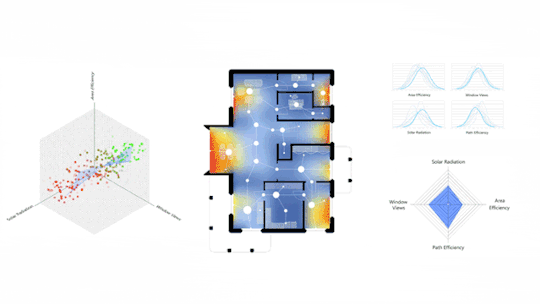

Breaking New Ground: The First Fully AI-Driven Architectural Project| Studio Tim Fu
Blending cutting-edge AI technology with Jože Plečnik’s architectural legacy, Studio Tim Fu unveils Lake Bled Estate—a stunning ensemble of ultra-luxury villas in Slovenia. This first fully AI-driven design redefines the future of architecture, proving that AI can be a catalyst for timeless, transformative spaces—where sustainability, biophilic design, and heritage seamlessly converge. https://www.indiaartndesign.com/breaking-new-ground-the-first-fully-ai-driven-architectural-project-studio-tim-fu/
#AIDrivendesign#computationaldesign#AIdesigntools#AI-poweredimagegeneration#Midjourney#Dall-E3#AutoDraw#Khroma#PiktochartAI#AdobeSensei#hospitalitydesign#firstfullydesignedAIarchitecture#villaarchitecture#indiaartndesign#StudioTimFu#AIArchitecture#LakeBledEstate#HeritageReimagined#SustainableLuxury#FutureOfDesign
0 notes
Photo

Generative design leverages computational power to simulate thousands of iterations in response to design parameters like energy use, structural integrity, or spatial flow. This efficiency pushes the boundaries of what architects can achieve. Yet, it raises the question: are we training architects to critically curate machine-generated designs or to deepen their role in crafting unique, human-centered environments? Could generative design reduce the risk of design redundancies, or does it risk producing repetitive algorithmic solutions when overused?
#architecture#generativedesign#futureofarchitecture#parametricdesign#designthinking#aiarchitecture#architectsdebate#aesthetics#sustainabledesign#architecturalinnovation#parametric#architecturedesign#architectureanddesign#architecturemodels#architectureideas
1 note
·
View note
Photo

Are we putting our humanity at risk by pursuing a perfect future? It may seem intriguing to use AI architecture, parametric design, and robotics to create a utopian city, but what are the consequences? Will we lose our sense of individuality in a society governed by algorithms and machines? Although the blend of technology and urban planning is transforming our world, are we prepared for the potential trade-offs? Let's consider whether this futuristic vision will truly bring salvation or lead us toward dehumanization.
#artificialintelligence#imagine#agi#technology#ai#cityoflove#architecturemodel#citylandscape#amazing#architecturelove#futurecity#architecture#parametricdesign#robotics#aiarchitecture#roboticsrevolution#utopiandreams#humanvsmachine#techsociety
3 notes
·
View notes
Text
지극히 주관적인 2024년 디지털금융(핀테크) 회고 및 트렌드
매년 주관적인 경험을 기반으로 디지털금융 및 핀테크 트렌드를 기록하고 있습니다. 2024년에는 계엄령 사태와 트럼프 당선, 무안항공 참사 등 유독 연말에 큰 이슈들이 많았던 것 같습니다. 또한, 고금리와 인플레이션 압박은 ‘뉴노멀’ 중 하나가 되었고 이러한 흐름은 ‘진짜’가 무엇인지를 가려내는 시간이 시작되었다는 것을 보여준 한 해 였다고 생각합니다. 더불어 Gen AI의 발전과 성숙화는 양극화를 불러일으키면서 뉴노멀의 시대에서 살아남을 수 있는 핵심적인 무기로 폭풍성장을 하고 있으며, 규제완화의 문턱을 지속적으로 넘어가고 있습니다. #Gen AI 활용 양극화#New AI Architecture#대출, 외환, 세무: 프로세스와 수수료 시장, 당연히 되는 시장#통합보다는 버티컬#블록체인과 디지털자산,…
#2024#2025#AIarchitecture#네이버페이#대출#디지털자산#가상자산#뱅크몰#뱅크샐러드#거래소#버티컬#규제완화#블록체인#genai#inex#삼쩜삼#세무#센트비#토스#수수료#트랜드#트럼프#트레블월렛#프라뱅#핀다#한패스#외환#회고#카카오페이#코인
0 notes
Text
Symbolic vs. Neural Reasoning in Modern AI Agents
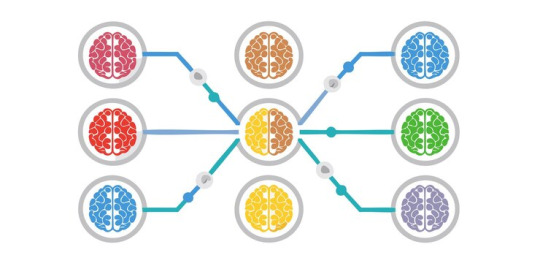
Modern AI agents often blend symbolic reasoning (rule-based logic) and neural reasoning (statistical pattern recognition). This hybrid approach helps agents handle both structured tasks and unstructured language.
Key Differences:
Symbolic: Deterministic, interpretable, ideal for planning or math-based logic (e.g., Prolog, decision trees).
Neural: Flexible, scalable, and suited for fuzzy tasks like summarization or sentiment analysis.
The Hybrid Advantage:
Use symbolic methods for task decomposition and validation.
Use neural models (LLMs) for open-ended generation and language understanding.
This hybrid design is at the heart of many current AI agents, enabling them to reason like humans while scaling like machines.
Let neural models generate candidate solutions and symbolic logic validate them—it improves both robustness and explainability.
1 note
·
View note





